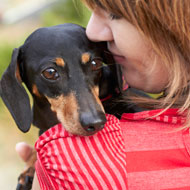Universal ‘code’ connects humans and animals - study

Researchers found there might be a universal code for the perception of emotion of animals.
Humans can identify emotions in the voices of all air-breathing vertebrates, a new study has found.
Writing in the journal Proceeding of the Royal Society B, researchers show there might be a universal code for the vocal expression and perception of emotions of animals.
Previous work found that humans can identify emotions in the voices of different mammals. In this new study, researchers expanded the results to include amphibians, reptiles and mammals.
The study was conducted by researchers at Vrije Universiteit Brussel, Belgium, and Ruhr-Universität Bochum, Germany, in collaboration with colleagues from Alberta, Canada, and Vienna, Austria.
“The findings suggest that fundamental mechanisms for the acoustic expression of emotions exist across all classes of vertebrates,” the authors conclude. “The evolutionary roots of this signal system might be shared by all vocalising vertebrates.
They continue: “This finding goes in the direction of what Charles Darwin suggested more than a century ago, namely that acoustic expressions of emotion can be traced back to our earliest land-dwelling ancestors.”
In the study, researchers employed 75 individuals whose native language was English, German or Mandarin. The participants listened to audio recordings on nine different species of land-living vertebrates in the classes mammals, amphibians and reptiles. The latter group included birds and other reptiles.
Participants were able to differentiate between high and low levels of arousal in the acoustic signals of all animal classes. To do this, they mainly relied on frequency-related parameters in the signals.



 The latest
The latest